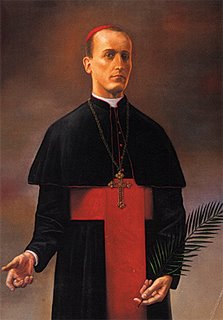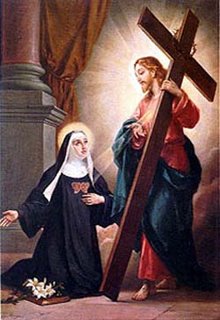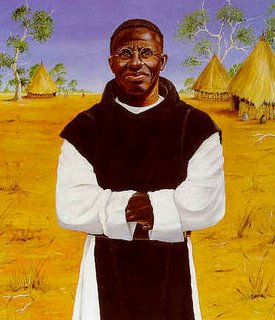
Alojzije was born in the year 1898 in the village of Brezaric, near Zagreb. His parents were devout Catholics and raised all their children with a deep devotion to their Catholic Faith and heritage. Alojzije attended school at the Classical Gymnasium where he shined in his studies and took the first steps of trying to join the Priesthood.
Unfortunately the First Word War interrupted Alojzije longing to become a Priest and he was sent for officer training. Upon completing this course Alojzije was sent to fight in the Italian front. During the course of many battles Alojzije was captured by the Italians and gained release in 1918. After demobilization Alojzije, he went on to study agriculture but his heart was not truly involved with this course and he became more interested in the Catholic youth in his area, whom he encouraged to grow in their Faith and to become strong Catholics.
So it was that in 1924 Alojzije finally listened and followed his heart into the Priesthood, he studied at the Pontifical Gregorian University and in 1930 he was finally Ordained as a Priest, his quest was over, but his mission had only just begun.
He served the Church as Priest in many capacities and in many parishes where disputes were taking place due to social and political upheavals. His abilities to calm stormy waters on the political and religious levels led Pope Pius XI to appoint him coadjutor Archbishop to assist Archbishop Bauer, in a pastoral capacity. He was to be the youngest Bishop at that particular time in history. He proved himself a worthy leader through his hard work and his willingness to be of help to all who needed him.
So upon the death of Archbishop Bauer, Bishop Ajojzije immediately took on the responsibility of the archdiocese of Zagreb. He did so with a zealous zeal to promote the Faith and in particular to focus on the Eucharist and to honour Our Lady through Eucharistic and Marian devotions. He tried to instill in the youth of the region how important the Eucharist is so they could grow strong in their Faith and be more faithfilled Catholics. He also relayed this message by using and at times instituting the press such as the Catholic daily paper Hrvatski Glas, in order to instruct the people of his dioceses and other Catholics in other regions to maintain a deep love and devotion to all elements of our Catholic Faith and to participate in the Sacraments of the Church as often as possible.
Archbishop Alojzije seemed untiring as he encouraged the Catholic laity to become more involved in parish life and to not leave it totally to the Priests or Religious the heavy burden of evangelising the Catholic Faith. He taught through the press and his own involvements how integral it was to spread the Good News of Jesus Christ through the Catholic Church to all people.
The love Archbishop Alojzije Stepinac had for the Catholic Church was enormous and he wished to share this fervent and zealous love to all so that they too could enjoy and share in the abundant fruits of the Church. The Archbishop also established a Carmelite Convent in Brezovica, Croatia, for he grasped the fundamental importance that prayer must play in each persons life and also in the life and spiritual health of the country.
It was just as well that this wonderful Archbishop laid such good ground work for Croatia would soon be swallowed up by the terror of the Second World War, which would leave its mark on generations to come. During the war Archbishop Alojzije kept up his pastoral duties and tried to instill in the people to remain faithful to Church teachings irrespective of political ideology, a formidable undertaking when one was confronting the diabolical ideology of National Socialism! The Archbishop was careful in keeping a distance from all political ideologies and influences, and though he loved his country he did not approve of the persecution of entire people due to their race or religion.
Through watching the viciousness of the Axis powers Archbishop Alojzije became an outspoken opponent to what he could see happening and criticized all those involved in the persecutions of the Jewish people and other crimes against humanity, he outright condemned all injustices done against the innocent. Not only was the Archbishop an opponent of the holocaust happening before his eyes he also took direct action in trying to save those most threatened including helping to save Jews, Serbs, Gypsies and other groups who were in the direct and rabid eyes of the Nazi's and their supporters.
This courageous Archbishop also stated to the people and those who were perpetuating a crime against the innocent these words, "Every nation and every race on the earth, has the right to a life worthy of a person and to treatment worthy of a person. All without differentiation, whether black or distinguished Europeans, despised Jews or haughty Aryans, have the same right to say: 'Our Father who art in Heaven!" He continued on and ended his speech with these ringing words, "And if God has granted this right to all, what human authorities can negate it?"
This man of great Faith and courage also disputed the efforts of some within the Catholic Church to impose 'forced' baptisms on those of a different faith but instead encouraged the Catholic laity and all peoples of good heart to save those in peril from a sense of human decency rather than religious coercion. Though he took this stance he also did not outlaw the Baptism of individuals if it meant saving their lives, while at the same time honouring the religious heritage of the Jewish people. In his own words the Archbishop said, "when this time of insanity passes, those who converted due to conviction will remain in our Church, while the others, when the danger passes, will return to their own".
This marvelous man of God was tireless in saving all people from all walks of life, even though he knew what such outspokenness could do to his own safety. He suffered many persecutions not only from the Nazi regime, but also his own people who wished to dissociate from someone so outspoken, but through the fire of his own dry martyrdom Archbishop Alojzije remained composed and strident in condemning such evil and on such a grand scale, he would not be quiet! This led the Nazi regime to try many attempts to assassinate this aggravating Priest who so strongly opposed their psychopathic genocide of whole races. And from within the Catholic community some also petitioned the Holy See to remove this worrisome Archbishop who could not and would not be silenced!
Unfortunately the tragedies that struck the people of Croatia was not over upon the ending of the Second World War, for once the Nazi's had gone they were soon replaced by the Communists. So it was in 1945 that Archbishop Alojzije Stepinac was arrested, and soon after had a reported conversation with the Partisan hero of the Communist Party, Tito, it was at this meeting that Tito made plain he wished to make a 'new catholic church' which would be renamed 'The National Catholic Church' which would maintain its independence from The Holy See, this was anathema to this devout son of the Church and he vigorously opposed it!
This stance set Archbishop Alojzije in direct opposition to the reigning Tito government, and it was through Communist propaganda waged against this most humble and courageous son of the Church that would eclipse the persecution he had faced when opposing the evil Nazi regime. This would become a clash of mammoth proportion to the peoples of Croatia as Tito set upon not only discrediting Archbishop Stepinac but the entire Catholic Church .
Let us look at the personal toll these horrendous years must have placed on Archbishop Stepinac, though he was not tortured physically one cannot discount the mental and emotional anguish this man suffered through as he watched whole peoples being extinguished from the face of the earth. He recognised from the first the evil intent of the Nazi regime and all those who embraced its evil intent, yet he continued to be outspoken irrespective of his personal safety. Not only this but he also encouraged Priests and Religious to do all they could to save those under persecution with full knowledge of what this meant to those courageous enough to heed the Archbishops call. Through all this Archbishop Alojzije Stepinac did not relent or give way to the incredible pressures that must have been placed on him. One can only imagine the hours of sleep he missed out on, the skipped meals, the hours of prayer he undertook to strengthen his own spiritual needs. The hours spent visiting and encouraging those who sought his help and intercession, the visits within his own Dioceses and the many speeches he made opposing the Nazi madness. We can only speculate the toll that this took on this great man who so vigorously and courageously spoke out against totalitarian regimes.
We should also not underestimate the power that Tito imposed on this country that had suffered through the Nazi persecution and would now suffer under his reign of terror! Tito was a master at propaganda so much so that he even opposed Russian interference and prevailed against Stalin himself! Tito was a law unto himself and so began the persecution and vilification of Archbishop Alojzije Stepinac, with the full co-operation of the Tito government.
Though Tito threw all he could at Archbishop Stepinac this did not impede nor did it scare this great man with the heart of a lion as he once again opposed an ideology that was in opposition to God and the Holy Catholic Church. Through this new and ferocious whirlwind of hate Archbishop Stepinac faced off with the 'red terror' and did not shrink nor hide from its viscous tentacles even when he was physically attacked and his home stoned, still the Archbishop stood strong against that formidable foe who had helped defeat Nazism only to impose his own ungodly regime, that was Tito's communism!
This infuriated the Tito government who then re-arrested Archbishop Stepinac and in a 'kangaroo court' the Archbishop was sentenced to 16 years of enforced labor in a prison camp at Lepoglava,during his imprisonment, he was in total solitary confinement, was constantly humiliated by the inhumane guards and suffered poisoning, which led to a decoration in his health. Later he would also suffer interment, totally isolated from his beloved people but this did not stop, Pope Pius XII proclaiming Archbishop Alojzije Stepinac a Cardinal, this led the Tito government to sever all connections to the Holy See.
Through all this Cardinal Stepinac kept up a correspondence to the faithful and encouraged them all in writing to remain strong and faithful Catholics, despite their many sufferings. Though Tito may have imprisoned Cardinal Stepinac physically he had no power over the Cardinals spirit which remained united to his beloved Church and his Beloved Jesus and Him Crucified!
In the end the love and courage showed by this Saintly man gained him the recognition he deserves by the Church and the world, while those who opposed this great man of the Church remain indicted for their cowardice and malice. While communist statues would be toppled, and leaders overthrown, one man stood alone and led the cry...."Free my people".
Cardinal Alojzije Stepinac died in 1960.
Blessed Cardinal Stepinac was beatified in 1998 by Pope John Paul II.
Peace of Christ to ALL
Copyright © 2006 Marie Smith. All rights reserved.
Roman CatholicCatholic Saints


